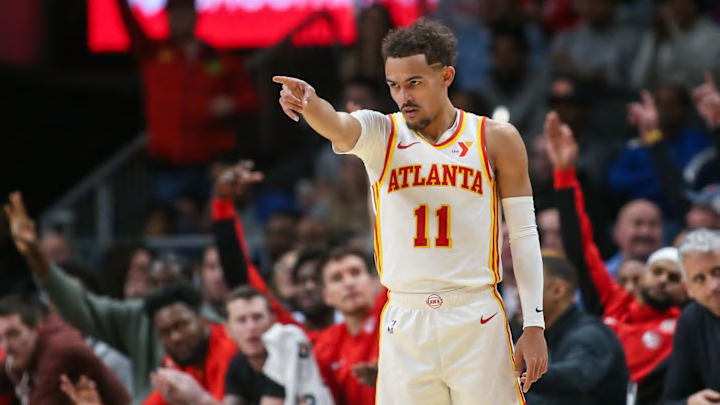After the Atlanta Hawks decided to swing for the fences this season, Kobe Bufkin's role within the team became much more unclear. Bufkin, the team's 15th pick in the 2023 draft, has averaged 5.0 points and 1.7 assists a night on 37.4% from the field and 22% from three through 27 games.
Despite the potential Bufkin possesses, he has not produced at the NBA level. Even worse, Atlanta's backcourt rotation became so crowded that he had no realistic path to meaningful minutes. Ultimately, his salary was dumped for cash considerations.
While the trade is rational considering Bufkin's level of play and competition for playing time, what doesn't make sense is the return package. Hawks voice Brad Rowland said on the Locked On Hawks Podcast that this move, in this moment, was not necessary from a strictly financial perspective. The Hawks could have just filled their roster with minimum contacts and remained below the luxury tax.
So, why would they make this move with no return? They could have tried to build Bufkin's value through the regular season to at least earn a second round pick back. Rowland agrees, saying, "if they don't add someone for more than the minimum, I gotta say, I will be confused. Not because I'm a Bufkin stan, [...] but there's a middle ground here."
By trading Bufkin, the Hawks have conspicuously created just enough cap space to use the Bi-Annual Exception (BAE) or the Clint Capela trade exception, valued at $5.1 and $6.5 million respectively, without exceeding the luxury tax. The BAE allows for a free agency signing, and the Capela exception allows for a trade with greater incoming salary. The key financial effect of the Bufkin trade is that it enables Atlanta to acquire a player who is earning more than the minimum.
Who could Atlanta be interested in with the cap space this move creates
One key detail of this trade is that the Hawks have not announced it, despite team sources confirming the trade. This is a common practice in the NBA, as the rest of the league can see the trade and potentially become involved. This led to the record-breaking 7-team trade involving Clint Capela, which was initially announced as a simple two-team trade.
Could Atlanta cobble together a trade package for a cheap player? Young guards Tyler Kolek and Devin Carter are rumored to be available on the trade market. An interesting counterpoint, however, is that both of these players are older than Bufkin yet have performed at a lower level in the NBA. Why would the Hawks punt on Bufkin for an older player who also isn't ready to compete?
The free agents that realistically could make above the minimum are Al Horford, Malik Beasley, and Russell Westbrook. Westbrook will be a popular answer for this role with his legacy and thrilling style of play, but he doesn't seem to fit this team. If Atlanta opts for a point guard, it would likely be a consistent "game manager" rather than the volatile Westbrook.
Horford and Beasley are genuinely impactful playoff players, despite their current employment status. In fact, both players should be on NBA teams, but the tumultuous NBA paused their plans. Horford was expected to sign with the Warriors over a month ago, but the Jonathan Kuminga contract situation has delayed this deal. There is a real possibility that the events of the last month could push Horford to explore his options.
Beasley has a different story. He was the hottest commodity in the NBA last year, thriving in a starting role for an exciting Pistons team. Two days before the start of free agency, however, Beasley became the target of a federal investigation for alleged gambling violations. Beasley has since been removed as a target of the investigation, but the damage was done. The massive free agency interest in him was not acted on, and teams spent their remaining cap space with the assumption that he would not play this season.
While an NBA investigation into Beasley remains, there is reason to believe he could play in the league this year. Perhaps Beasley could be acquired via sign-and-trade, rounding out a flamethrowing Hawks squad.
September signings rarely have postseason impact, but the unusual circumstances surrounding Horford and Beasley have left the two players available in free agency despite playing key roles on playoff teams last year. The timing and lack of return for Bufkin does not feel like a coincidence.
